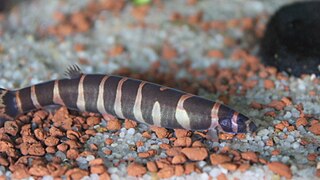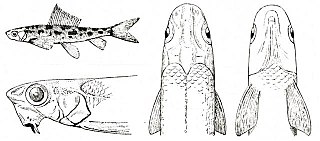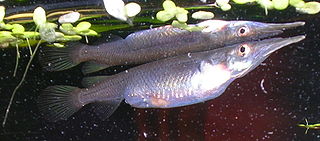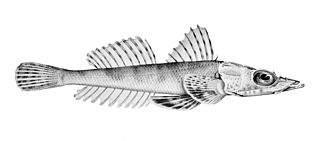
The archerfish or Toxotidae are a monotypic family of perciform tropical fish known for their unique predation technique of "shooting down" land-based insects and other small prey with jets of water spit from their specialized mouths. The family is small, consisting of ten species in a single genus, Toxotes. Most archerfish live in freshwater streams, ponds and wetlands, but two or three species are euryhaline, inhabiting both fresh and brackish water habitats such as estuaries and mangroves. They can be found from India, Bangladesh and Sri Lanka, through Southeast Asia, to Melanesia and Northern Australia.

Pangio is a genus of small Asian freshwater fish in the true loach family Cobitidae. In earlier taxonomic schemes it was known as Acanthophthalmus. The "kuhli loach" is well-known in the aquarium trade and commonly identified as P. kuhlii, but most individuals actually appear to be P. semicincta.

Rasbora is a genus of fish in the family Cyprinidae. They are native to freshwater habitats in South and Southeast Asia, as well as southeast China. A single species, R. gerlachi, is only known from an old specimen that reputedly originated from Africa (Cameroon), but this locality is considered doubtful. They are small, up to 17 cm (6.7 in) long, although most species do not surpass 10 cm (4 in) and many have a dark horizontal stripe.

Clarias is a genus of catfishes of the family Clariidae, the airbreathing catfishes. The name is derived from the Greek chlaros, which means lively, in reference to the ability of the fish to live for a long time out of water.

Paedocypris is a genus of tiny cyprinid fish found in swamps and streams on the Southeast Asian islands of Borneo, Sumatra and Bintan.

Hemirhamphodon is a genus of viviparous halfbeak fish. Most recognized species are endemic to lowland forest streams, rivers and swamps in Borneo, but H. phaiosoma and H. pogonognathus are also found elsewhere in Southeast Asia. The largest species reaches about 10 cm (4 in) in length. These fish are viviparous and are sometimes kept as aquarium fish, but otherwise have no commercial value.

Carinotetraodon is a polyphyletic genus of small freshwater pufferfish found in South and Southeast Asia. Several species have commercial importance as aquarium fish.

The threadfin acara, also known as Heckel's thread-finned acara, is a South American species of cichlid fish. It is the only member of the genus Acarichthys and is native to rivers in the Amazon and Essequibo basins in tropical South America, and has become established in southeastern Asia. It is sometimes found in the aquarium trade.

Barbodes is a genus of small to medium-sized cyprinid fish native to tropical Asia. The majority of the species are from Southeast Asia. Many species are threatened and some from the Philippines are already extinct. A survey carried out in 1992 only found three of the endemic Barbodes species, and only two were found in 2008. Several members of this genus were formerly included in Puntius.

Leiocassis is a genus of bagrid catfishes found mostly in Southeast Asia with some species occurring in China.
Pseudomystus is a genus of catfishes of the family Bagridae.
Encheloclarias is a genus of airbreathing catfishes endemic to Southeast Asia.

The cleftbelly trevally, also known as the cleftbelly kingfish, Kuweh trevally or thin crevalle, is a species of tropical marine fish of the jack family, Carangidae. The species inhabits coastal waters throughout the Indo-West Pacific region from South Africa in the west to Japan in the east, often found near the water's surface. The cleftbelly trevally is the only member of the genus Atropus and is distinguished by a number of anatomical characteristics, with a deep median groove in the belly giving the species its common name. It is not a large fish, growing to a maximum recorded length of 26.5 cm. Cleftbelly trevally are predatory fish, taking a variety of small crustaceans and fish. The species is of minor importance to fisheries throughout its range.

Betta is a large genus of small, active, often colorful, freshwater ray-finned fishes, in the gourami family (Osphronemidae). The best known Betta species is B. splendens, commonly known as the Siamese fighting fish and often kept as an aquarium pet.
Ompok is a genus of fish in the family Siluridae found in lakes and large rivers throughout South and Southeast Asia.
Pseudogobiopsis is a genus of fish in the goby family, Gobiidae. They are native to fresh and brackish waters of southern and southeastern Asia. The genus is mainly distinguished by the number and arrangement of fin rays and spines, headpores, and sensory papillae, the large mouths of the males, a fleshy or bony flange on the pectoral girdle, and the shape of the genital papilla.

Ellopostoma is a small genus of loaches native to Southeast Asia. This is the only genus in the family Ellopostomatidae, having been confirmed as being in a family of its own by M. Kottelat in his review of the loaches in 2012.

Zenarchopteridae, the viviparous halfbeaks, is a family in the order Beloniformes. The Zenarchopteridae exhibit strong sexual dimorphism, practicing internal fertilisation, and in some cases ovoviviparous or viviparous. The members in the family are mainly found in fresh and brackish water of tropical Asia and New Guinea, but the genus Zenarchopterus also includes marine species from the Indo-Pacific. Several, such as the wrestling halfbeak, have become commonly traded aquarium fish.

The tuberculated flathead is a species of marine ray-finned fish belonging to the family Platycephalidae, the flatheads. This species is found in Indian and Western Pacific Oceans.














